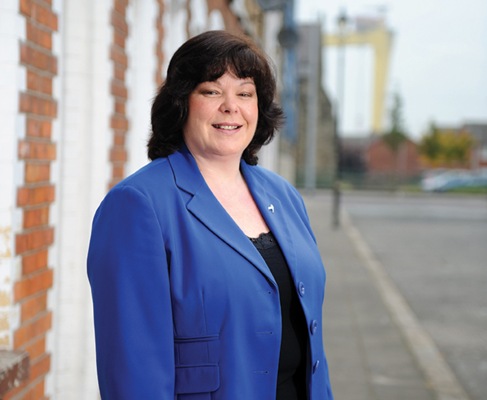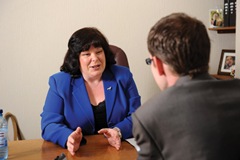The leaders: Dawn Purvis interview
In the last of our series on party leaders, the PUP’s Dawn Purvis answers Peter Cheney’s questions on loyalism and her campaign for cleaner politics, along with telling why she thinks hers is the only party with a vision for the province.
“Purely by accident” is how Dawn Purvis describes her entry in politics. She was doing voluntary work when her children were younger when a friend who was already in the party suggested that she joined.
Her initial reaction was a strong ‘no’, thinking about the party’s links with the UVF and what her mum would say. However, when she read a copy of its manifesto, Purvis “could understand it and couldn’t disagree with anything that was in it.” The party’s policies on education, housing, women’s rights and human rights struck a chord.
“Certainly the historical roots of the party grew from the UVF,” she states, adding that over time it became a “stand alone party”. Its main work was and continues to be ‘conflict transformation’. The party has explained that is a different concept from ‘resolution’ or ‘management’. Essentially, it accepts that the conflict cannot be resolved but must be transformed from an armed and violent state into peaceful and democratic one.
In Purvis’ view, the phrase means working for peace, transforming both paramilitaries and the loyalist working class communities most affected by the Troubles.
Among her mentors Gusty Spence, Billy Hutchinson and Billy Mitchell stand out. Mitchell wrote much of the party’s policies. And no discussion of the PUP would be complete without mentioning David Ervine.
“He was such an inspirational and charismatic leader, and very committed and honest individual for what he wanted for Northern Ireland,” he remarks.
Vision
Representing parts of Belfast, it would seem easy to write off the PUP on paper as a small player in today’s politics compared to the days of the Good Friday Agreement. That, though, does not stop its leader from making a major claim.
“I think the PUP is probably the only party in Northern Ireland that offers a vision for Northern Ireland,” Purvis affirms, outlining that vision as “a community at peace with itself, at peace with its neighbours” where people can go to school, work and socialise together.
Turning to its larger rivals, she sees the DUP and Sinn Féin “squabbling” to protect their own interests. The UUP and SDLP, for their part, look to London and Dublin while the PUP looks to the province. She fears a “notion of separate but equal” taking shape with the same sectarian fault-lines remaining.
It was put to her that the Alliance Party would say the same. Her response is that party wants to get “from A to Z” but has “no process in the middle” to achieve the desired shared future. The PUP’s activists, for their part, are community development workers, who “do the work on the ground in the community”, and that gives it an edge over many of the other parties.
“We come from the grassroots,” she contends.
While the PUP has those grassroots so too does the DUP. Peter Robinson, for example, grew up in East Belfast’s Cregagh estate. However, in the PUP’s view, having working class roots is not always the same as representing working class interests, something which she claims the DUP is failing to do.
Academic selection is a case in point with working class children “disadvantaged all their lives” as a result. Indeed, she instead prefers to describe it as “social selection”, which infers division between the middle and working classes.
As for the party’s future, it has its sights set on making gains in the next Assembly and local elections, both to be held in 2011. The party won over 20,000 votes in the late 1990s but polled just under the 4,000 mark in 2007.
The PUP already has some reach outside its East Belfast base. Councillor John Kyle represents South Belfast’s Ravenhill Road, as part of his Pottinger area, while Hugh Smyth’s council seat covers the Shankill. Traditionally seen as working class, its members also include those from middle class backgrounds, including social workers, doctors and teachers.
Loyalist decommissioning is coming late in the political process. The UVF put its arms “beyond reach” in May 2007 before destroying them in June 2009. It remains illegal, one of 14 outlawed groups in the province, and it was put to Purvis that it was now time for it to disband. In reply, she pointed to the UVF’s May 2007 statement and said it was something that was due to happen.
That ‘statement of intent’ said that the UVF and the Red Hand Commando, a related organisation, were assuming a “non-military, civilianised, role”. This included an end to recruitment, “military” training and targeting, and all intelligence being “rendered obsolete”.
In the PUP’s view, paramilitary organisations did not appear overnight and are unlikely to disappear immediately either. However, Purvis hopes that they will continue on the path they’ve started.
Generally, she thinks the PUP has done a “pretty good job” after “years of neglect” with unionist MPs at the helm. Underinvestment and de-industrialisation are seen as evidence of this but the party has been keen to bring about change for the better: “It’s about having a positive influence in the community, rebuilding communities, having a pride in our community.”
Only one job
In recent months, Purvis’ proposals to clean up politics have received media attention. Her Private Member’s Bill proposes an end to dual mandates where an MLA is also a councillor; vacant council seats would then be filled by cooption.
A ‘partnership council’ to co-ordinate the work of local and regional government is also mooted, along the same lines as the Welsh model. “It’s about connecting local government with the Assembly, looking at issues of mutual interest and working towards common goals.”
Public consultation on the Bill found strong support for an end to double jobbing. Twenty written responses were made and an equal number of informal responses collected in a discussion with voluntary and community sector workers. Two respondents disagreed with the suggestion, two were unsure and the rest agreed.
This call will remain in the Bill but others will be removed from the final version as they are being dealt with elsewhere. Westminster handles electoral policy and Environment Minister Edwin Poots is considering the partnership proposal. A request to introduce the legislation has now been sent to the Speaker.
“The reasoning behind it is looking at the values and the principles that you want instilled within the political system here within Northern Ireland,” she explains.
“The whole scandal around expenses, the perception in the public mind of the building of family dynasties, people amassing great wealth at the public’s expense and drawing multiple salaries just really doesn’t complement the principles of openness and accountability – flies in the face of them actually.”
Other signs of strain are the Executive’s failure to meet in late 2008, and the main parties’ divisions over devolving policing and justice, the strategic review of parading and a bill of rights, where issues appear to be turned into sectarian arguments.
Those problems have together created a “crisis of confidence” in devolution and she sees a need to move quickly to rebuild public confidence. Double jobbing is therefore an issue that “goes to the heart of that.”








